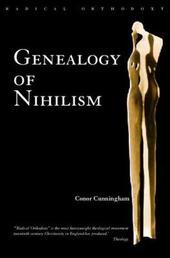
|
Genealogy of Nihilism
Paperback
Main Details
Description
Nihilism is the logic of nothing as something, which claims that Nothing Is. Its unmaking of things, and its forming of formless things, strain the fundamental terms of existence: what it is to be, to know, to be known. But nihilism, the antithesis of God, is also like theology. Where nihilism creates nothingness, condenses it to substance, God also makes nothingness creative. Negotiating the borders of spirit and substance, theology can ask the questions of nihilism that other disciplines do not ask: Where is it? What is it made of? Why is it so destructive? How can it be made holy, or overcome? Genealogy of Nihilism rereads Western history in the light of nihilistic logic, which pervades two millennia of Western thought and is coming to fruition in our present age in a virulently dangerous manner. From Parmenides to Alain Badiou, via Plotinus, Avicenna, Duns Scotus, Ockham, Descartes, Spinoza, Kant, Hegel, Heidegger, Sartre, Lacan, Deleuze and Derrida, a genealogy of nothingness can be witnessed in development, with devastating consequences for the way we live. As dualistic logic, nihilism has come to ground existence not in life but in the absences beyond it. We who are, are no longer the living, but rather the living dead; in the death-wielding modern approach to knowledge, we are all reduced to cadavers. Nihilism, in erasing the real distinctions between mere objects or things and the life within life itself, furthermore threatens the spiritual discernment that permits the experience of goodness, truth and beauty. Consequently, the awareness of the qualitative distinction between things, between an ice-cream and a holocaust, is extinguished. The Trinitarian theology of Genealogy of Nihilism offers a counterargument that is sustained by nihilism even as it defeats it. In Christ's ontological synthesis of divine spirit and incarnation, and in the miraculous logic of the resurrection, theology reunites presence with absence, non-being with being. Seeing things in their actual complexity and incongruity, it allows for real difference and the existence of something-as-nothing in the world. Furthermore, this ability to discern difference resides within an agnosticism of the faithful wherein the strict identity of sameness and difference, self and other, believer and non-believer is subtly but profoundly challenged. Conor Cunningham's elaborate and sophisticated theology, spanning the disciplines of philosophy, science and popular culture, permits us to see not simply how modernity has formulated its philosophies of nothing, but how these philosophies might be transfigures by the crucial difference theology makes, and so be reconcilable with life, and the living - with the very gift which being is.
Author Biography
Conor Cunningham is a doctor of theology and teacher of divinity at the University of Cambridge. His previous academic interests have included the study of Law, Social Science and Philosophy, and he was among the original contributors to Radical Orthodoxy: A New Theology (Routledge, 1999).
Reviews'This is an audacious work and it is difficult to do justice to the complexity of the argument or the subtlety of the terms invoked. However, this work also sparkles with simplicity ... Overall this is a dazzling performance ... It provides an important addition to the literature on nihilism.' - Marcus Pound, Reviews in Religion and Theology
|